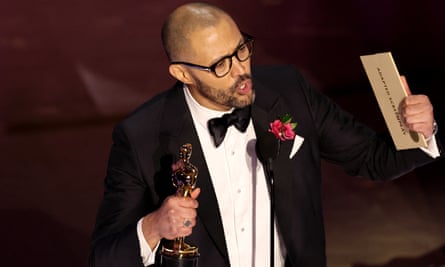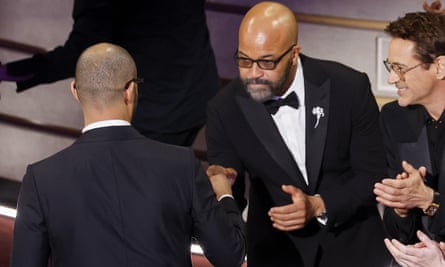T
The Academy Awards of this year will be remembered for the return of its success. A highly-anticipated movie with both critical acclaim and impressive ticket sales claimed victory, but there was a good mixture of light-heartedness, nudity, and political commentary to cater to everyone, as the producers intended.
After nine years since the #OscarsSoWhite scandal, where only white actors were nominated, diversity was noticeably absent from the discussions surrounding the Oscars, including the Barbie-dominated pre-show and the Oppenheimer backlash.
Maybe this is due to the fact that the Oscars have made significant improvements since the low point of two consecutive years of predominantly white nominees in 2015 and 2016. This year, there were seven actors of diverse backgrounds nominated, which is the same number as last year. These nominees include Lily Gladstone, Danielle Brooks, America Ferrera, Colman Domingo, Sterling K Brown, and Jeffrey Wright. Additionally, Da’Vine Joy Randolph won best supporting actress for her role in The Holdovers.

A woman director, Justine Triet, was once again a contender, and emerging, captivating writers like Cord Jefferson were acknowledged – all in the year when the Academy’s diversity guidelines were implemented and appeared to be effective.
To be considered for nominations, productions must meet a set of standards ranging from diverse casting to leadership, crews, and marketing.
They have been referred to as “weak and flashy” in the same manner that Bafta’s comparable rules were condemned for being merely superficial in an industry that is plagued with major issues of inclusion.
The criteria for an Oscar nomination are undeniably simple to fulfill, resulting in a lack of diversity in the eligible films. For instance, Oppenheimer was able to qualify due to the significant presence of women in leadership roles during production, even though there was a noticeable absence of marginalized communities on screen.
According to Jeanell English, who was employed at the Academy to focus on promoting diversity and inclusivity, implementing stricter regulations could have jeopardized the support and progress within the industry.
The remark appears to validate the claims that black, Latino, and east Asian individuals have been expressing for a long time: Hollywood shows a superficial interest in diversity. The flexibility of the recent changes to the Oscar criteria has raised doubts about the effectiveness of taking a gradual approach.

Filmmaker Spike Lee, who has been repeatedly questioned about diversity and the Oscars, believes that attention should be directed towards the influential gatekeepers, rather than the new standards, which he believes have flaws. He stated that these individuals are the ones who ultimately determine the content, creators, and stars of the industry.
Upon examining the results of this year’s awards, his statement remains valid. The movie American Fiction, which featured a predominantly black cast, was nominated for five awards and won Best Adapted Screenplay. Interestingly, the film was funded by Orion, a studio managed by a black woman named Alana Mayo, who believed in the project despite other studios rejecting it.
Wright is often praised as one of the most skilled character actors of his time and was finally nominated for Best Actor. In an interview with the Guardian, he shared that this was the first time he had received such overwhelming support for a film in which he played a central role. This serves as a reminder of the longstanding habit for studios to overlook diverse talent, highlighting the necessity for change.
“Skip over the advertisement for the newsletter.”
after newsletter promotion
At the Oscars ceremony, director Jefferson urged the influential gatekeepers mentioned by Lee to be more open to taking risks. He lightheartedly noted that many people had initially rejected his film, but clarified that he was not seeking revenge; rather, he wanted to emphasize the fact there are countless individuals who yearn for the same chance he was fortunate enough to receive.
Jefferson’s remarks indicate the significant impact of the film industry on the diversity of the Oscars.
New studies have revealed that diversity is decreasing in various fields. This trend is most prominent in the lack of female leads in major film productions, which is currently at its lowest point in 10 years. Additionally, there has been a decrease in the number of movies directed by both white and diverse females.
In other places, a string of notable departures from top positions in Hollywood by women of color has been labeled as a concerning trend. Additionally, another analysis projected that the film industry in the UK will not achieve equal representation for genders until 2085.
The Oscars ceremony may have gone smoothly this year, but nearly 10 years after Hollywood’s push for diversity, there are still deep-rooted obstacles in the industry that cannot be fully addressed by the Academy’s inclusion guidelines.
Source: theguardian.com





















